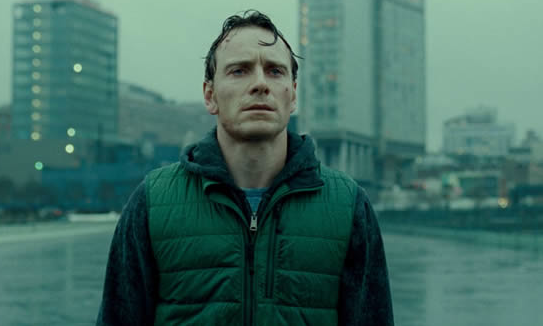[2011] VENICE BIENNALE | Shame & Tinker, Tailor, Soldier, Spy
The surprise winner of the 68th Venice Film Festival was Russian master Alexander Sokurov’s hallucinogenic take on the Goethe’s “Faust” (pictured).
But before the International Jury, chaired by Darren Aronofsky and featuring David Byrne, Todd Haynes and André Téchiné handed out their statues, much award buzz was being devoted to Steve McQueen’s “Shame” and Tomas Alfredson’s “Tinker, Tailor, Soldier, Spy.” In spite of the award outcome, the films remain two of the stronger entries in the competition section.
Swedish director Tomas Alfredson exploded onto the international scene in 2007 with his unsettling child vampire flick, ‘Let the Right One In.’ In that film, he took a rather implausible premise and turned it into one of the more unsettling horror films of recent memory.
Pushing forward into the realm of the improbable, Alfredson appeared at Venice with his surefooted adaptation of John Le Carre’s unfilmable novel “Tinker, Tailor, Soldier, Spy” (the only other adaptation of the book is the famous 7-hour-long BBC series that starred Alec Guiness).
Working with an A-list of British actors including John Hurt, Colin Firth, Gary Oldman and Tom Hardy, Alfredson had made a surprisingly melancholy espionage thriller about a lonely group of intelligence men at the height of the Cold War. For this reason, it seems unfair to judge “Tinker, Tailor” by the standards of other recent spy films. Its deliberate pacing, tight ensemble cast and cerebral quality make it a stark counterweight to “Casino Royale.” In visual terms, it is also the polar opposite of the Bond franchise. The Cold War world that the film conjures is impeccably replicated and artfully drained of color. The locations it spans–from London to Budapest to Istanbul and Paris–are both instantly identifiable and vaguely anonymous. Like the film’s weary protagonists, the cities seem used-up, neglected and disappointed.
The ingenious screenplay by Bridget O’Connor and Peter Straughan condenses the novel’s maze-like structure into a single story line. Le Carre’s hero, George Smiley (Oldman), is coaxed out of retirement to track down a Soviet mole in the highest echelon of the British secret service. Oldman’s magnificently understated performance is one of his best ever. Behind his dark framed glasses, his eyes twinkle with a cool intensity and intelligence.
Slick and graceful, the film has such a musical sweep – indeed, the camera is virtually never at rest – that the only thing that feels slightly amiss is that the final revelation comes too soon. But then again, the film isn’t about a thousand twists and turns or keeping you on the edge of your seat waiting for a bloody showdown. “Tinker Tailor” doesn’t so much keep you guessing as it tightens the coil slowly and methodically. This is a thinking man’s espionage epic that rewards patience and attention to detail.
Unlike Alfredson, the British visual artist Steve McQueen didn’t have a single feature to his credit when “Hunger,” his film about the 1981 Irish hunger strike, wowed audiences at the 2008 Cannes Film Festival, where McQueen won the festival’s Golden Camera for best debut.
Three years later, McQueen arrives in Lido for his disturbing and worthy sophomore effort “Shame.” Working again with the excellent Michael Fassbender (also featured here in the Cronenberg’s “A Dangerous Method”) in a raw and complex performance that won the festival’s best actor award, McQueen has created a grim and explicit look at the nature of sexual desire.
Fassbender plays Brandon, a successful New York executive who is dangerously enslaved to his libido. We see Barndon trying to pick-up a girl on the subway, disappearing into his office bathroom to masturbate and reflexively turning to porn sites upon returning from work. But unlike “American Psycho’s” Patrick Bateman, this good-looking and sexually magnetic “master of the universe” is also eminently sympathetic. His irrepressible horniness – and the methods he devises to still it – is a crippling addiction that renders his expensive lifestyle drained of pleasure. His attempts at meaningful relationships are deeply unsatisfying. It is even unclear how much pleasure he derives from fulfilling his single-minded goal. In fact, the only solace in his life seems to be J.S. Bach, whose music is masterfully used throughout the film.
The film’s turning point comes when Brandon’s sister (Carey Mulligan) expected drops in to stay with him, following a break-up. This visit provides much of the film’s more uncomfortable material. The sister takes Brandon’s sleaze ball of a boss back home for a one night stand, effectively “sexiling” her brother, and later on, discovers Brandon’s compulsive need for porn and masturbation.
The shame of the film’s title, which also finds Brandon when mountains of porn are discovered on his work computer, is, however, only one of the animating forces that drive the film to its frenzied finale. Here, in a nighttime sexual odyssey that plays like “Eyes Wide Shut” on crack, Brandon gets his face busted in by the boyfriend of a girl he fondles in a bar, finds a sympathetic mouth in a gay club, and hires two prostitutes for a ménage-a-trois that goes past dawn. The sequence is powerfully built, with a jarring montage that cuts between the various acts of debauchery and the morning after, but is also so lurid that it nearly upends an otherwise understated and delicately composed film.
Given that the director is a Brit on location New York, it is tempting to read the film not merely as a closely observed character portrait but also of a comment about an affluent consumerist society that promises constant distraction and instant gratification. Beautiful and provocative, it definitely deserves an audience. Finding distribution in the US, however, is sure to prove more difficult than “Hunger,” due to the film’s extreme sexual content.







